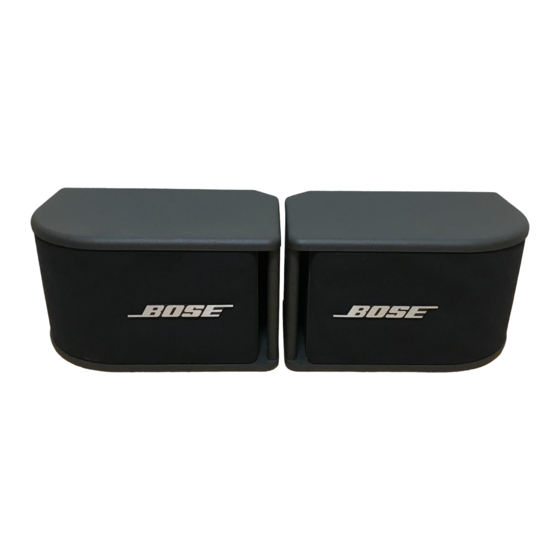Bose 300PM Manuel d'entretien - Page 4
Parcourez en ligne ou téléchargez le pdf Manuel d'entretien pour {nom_de_la_catégorie} Bose 300PM. Bose 300PM 16 pages.
Également pour Bose 300PM : Manuel (13 pages)

SmartProtect Crossover PCB operation and troubleshooting
Note: Refer to Figure 3. Model 300PM Loudspeaker schematic diagram, for
the following information.
The SmartProtect PCB is an electronic switch, in series with the drivers, used
to protect the drivers from high current levels. It has a fast turn-on time of 100
milliseconds. At turn-on, current will flow through R16, R15, C2, D1, D2, C1,
and R18. C2 and C3 form a virtual power supply which is used to provide
operating voltage for the circuit as well as the bias for Q7 and Q8. This bias is
limited by the zener diode D3 to 6.8 V. D1 and D2 form a voltage doubler.
Once C2 is charged, Q9 will conduct and provide a charge path for C3. Once
C3 is charged and the input audio voltage becomes lower than 1.5 Volts, Q9
will turn off. With Q9 shut off, the charge on C3 provides a voltage used to
operate the circuit for up to 5 hours.
R15 is a current sensing resistor. If current levels through it are too high, it will
turn on either Q3 or Q4. This will pull the base of Q1 to the virtual ground,
tripping the monostable multivibrator formed by Q1 and Q2. This will provide a
250 to 300 millisecond positive pulse to the base of Q5, turning it on for that
amount of time. While Q5 is conducting, it will apply 0 Volts to the gates of Q7
and Q8, shutting them off and disabling the loudspeaker for that amount of time.
Once the charging of C5 through R2 is completed, Q5 will shut off again, turning
Q7 and Q8 back on, and allowing the speaker to operate again. If the overload
condition persists, it will trip the circuit again after about 10 ms, shutting off the
drivers again.
1. If PTC1 is open, the unit will not play at low volume levels (Vin < 1.5 Volts)
when the system is first turned on, but as the volume is increased, the
SmartProtect circuit will turn on, and the speaker will operate. It will then
operate for 5 hours, until the charge on C3 is too low to keep the circuit running,
and then the speaker will shut off again.
2. If either R18 or R16 is open, there will be no charge path for the virtual power
supply formed by C2 and C3, and the circuit will never turn on. The symptom
will be that the speaker will play at low volume levels (Vin < 1.5 Volts), but as
the volume is turned up, the speaker will stop operating. This may also happen
if for any reason Q7, Q8 or any other component in the circuit fails, and the
internal safety "watchdog" C7 turns the Q5 on preventing the Q7 and Q8 from
being overheated.
Troubleshooting
4
